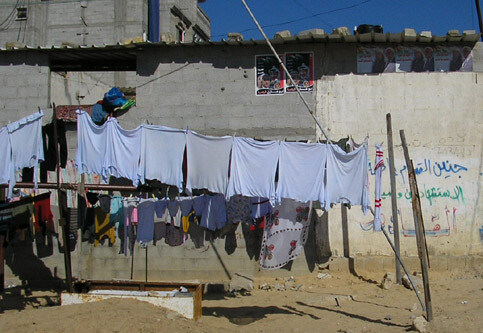United Nations Conference on Trade and Development (UNCTAD) 11 May 2006

The study recommends that Palestine try to shift away from its close economic involvement with Israel. (Arjan El Fassed)
Deteriorating economic performance and declining living conditions under more intensive restrictions in the occupied Palestinian territory since 2000 have left Palestinians frustrated by higher levels of poverty and unemployment and have damaged the already weak government of the Palestinian Authority (PA), a new UNCTAD study reveals.
The study, titled “The Palestinian war-torn economy: aid, development and state formation,” recommends that the PA complement short-term emergency responses with long-term planning and policies that focus on poverty reduction and employment growth; that it try to use crucially needed foreign aid in a “non-distorting” way that won’t hinder future economic growth and won’t leave the population dependent on such assistance; that Palestine try to shift away from its close economic involvement with Israel; and that the PA set up effective and transparent institutions for eventual statehood despite an uncertain future for Palestine with no end in sight to the Israeli occupation. The study was prepared by the UNCTAD unit on Assistance to the Palestinian People with contributions from Mushtaq H. Khan of the School of Oriental and African Studies of the University of London and Fadle M. Naqib of the University of Waterloo of Ontario, Canada.
The study notes that under the Israeli occupation “the institutionalization of restrictive measures, in the context of what my be termed a policy of asymmetric containment, has inflicted a heavy toll on the economy” and has locked it in an “adverse path dependence”. With “intensification of constraints and the overwhelming challenge of building modern, transparent public institutions in such an environment, the quality of PA governance since the interim self-government period could only deteriorate,” the study remarks. It adds that it is not surprising that PA governance “came to be viewed so harshly by observers, donors and evidently by the Palestinian people themselves as witnessed by the Palestinian legislative elections of 2006.”
The study indicates that the Palestinian economy suffered declines in Gross Domestic Product every year from 2000-2004. Any upturns have proven to be short-lived and dependence on foreign aid has mushroomed, while shifting markedly from development programmes to emergency relief and budget-support. In 1999-2000, some 88.1% of donor support to the PA went to development, 9.4% to emergency programmes, and 2.6% to budget support. During 2001-2004, by contrast, only 28.4% of donor support went to development projects, while 29% went to emergency programmes and 42.6% was dedicated to budget support.
These conditions have led within the PA to “an evolving debate that is yet to produce clear outlines, much less a consensus, on the optimal strategy for setting the economy on the path of recovery and sustained development.” So Palestinian development efforts face a “multiple challenge, whereby recovery and reconstruction must proceed under: (i) adverse conditions of conflict; (ii) intensified, systematic mobility restrictions; (iii) lack of national sovereignty; (iv) an ambitious, if not unrealistically large-scale, reform agenda; (v) limited policy space available to the PA to manage the economy; and (vi) its now systemic dependence on foreign aid.”
“There is no question,” the study states, “that in the immediate future, humanitarian relief and budget support must continue to account for a major part of aid delivery. But vital as they may be, such instruments have to be recognized as inadequate for making a dent in Palestinian poverty and economic vulnerability in a context of asymmetric containment. Rather, a long-term relief strategy for the Palestinian economy is needed, and it is this that may be viewed as non-distorting aid.”
The study also notes that corruption continues to be a problem, though one largely linked to the asymmetric containment policy to which the Palestinian economy is subject. The study cites progress in some areas, including public finances and the development of an integrated, computerized customs system, but building on such achievements has been constrained by continued conflict conditions and the absence of sovereignty.
The study argues that development aid should take into account the Palestinian territory’s special circumstances and shouldn’t impose conditions based on unfettered liberalisation and market reforms that may not be effective under circumstances of occupation, restrictions on movement, and the PA’s lack of control over economic fundamentals. Effective aid requires “going beyond the conventional economic policy wisdom and tailoring the development process to the economy’s present distinctive features and institutional set-up.”
The findings of this study will be presented to Palestinian public and private sector experts and concerned international agencies in a forum organised by UNCTAD in cooperation with the Palestinian Economic Policy Research Institute (MAS) in Ramallah on 17 May. The one-day event will also unveil an UNCTAD economic and trade scenario analysis model prepared with MAS.
To download the full report (PDF) click here.
Related Links